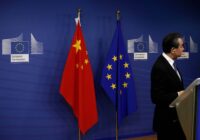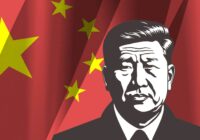It should be apparent to most observers of international relations that the Chinese government wants the world to play by its own set of rules. Beijing appears to believe that China’s rise and its assumption of global leadership positions are an inevitable extension of earlier periods in its history, when it was the world’s most powerful country. This is often at odds with the global norms that have been established — with China’s participation, it is worth adding — since the 1940s. While this is clearly the Chinese century, few outside of China would agree that Beijing’s global leadership is either inevitable or necessarily desired — certainly not on the Chinese government’s terms.
Consider, for example, China’s self-proclaimed leadership in the ongoing global climate change discussions. As the world’s largest polluter and consumer of coal to fuel its power plants, for many years China was a passive participant in these discussions. The US withdrawal from the Paris Climate Agreement provided an opening for Beijing to assume a more robust position in the talks. But it decided to step up to the plate while it remains the world’s biggest carbon emitter as its carbon emission levels continue to rise, and as it continues to export dirty power technology to much of the rest of the world via the Belt and Road Initiative.
The Chinese government wants to become the leading voice for developing countries on the subject of climate change and carbon emissions while promoting the concept of a dual set of standards for developed and developing countries — more stringent for the former and less so for the latter. So, which is China, a developed or a developing nation? Depending on the subject, Beijing would have the world’s nations believe that it is both.
The Chinese government is a virtuoso at getting away with whatever it can by virtue of the country’s size and importance. For decades, Beijing has gotten away with things that most nations would never even have attempted, such as its mass theft of intellectual property, brazen repeated cyber intrusions and cherry-picking which parts of its international treaties it actually adheres to. As Washington slept, Beijing expropriated the Spratly and Paracel Islands and stole critical military technology that enabled China to become a leading military power.
To Out-Think Beijing, Washington Will Need to Adopt Visionary Planning
READ MORE
The Chinese government is in the process of superimposing its unique world view on the rest of the world. That vision is about more than mere competition on the global stage. It is about eviscerating Western-crafted norms in pursuit of its long-term objective of becoming the world’s leading economic, political, technological and military power. While Western nations are busy tripping over themselves regarding protocol, diplomacy and human rights, Beijing is busy bulldozing the landscape. The Chinese government has expertly identified the flaws and frailties of the Western model of politics and diplomacy to craft its own version based on its own values, rules and norms.
One could argue that China is really no different than any other leading nation in that it determines what matters, what its preferred rules of engagement are and who it prefers its allies to be. But Beijing sees how far it can go to realize its own ambitions in its own way. What makes China different is that it appears to know no boundaries in its quest for supremacy.
Beijing has become masterful at pushing right up to the boundary of internationally acceptable behavior, then crossing over the line, retreating and doing the same again until it establishes a new normal for what is deemed to be acceptable. It appears that Beijing is incapable of speaking the vernacular of international diplomacy in a manner commensurate with established international law and the expectations the global community has of responsible leading nations.
It is important that the world has its eyes wide open about what the Chinese government is, and is not. Beijing needs to be held responsible and taken to task whenever it recklessly breaches international standards, laws and norms of behavior. If the world fails to keep it in check, the Chinese government can only be expected to continue to do the same, while methodically implementing its own set of rules that it expects the world to abide by. It is incumbent on the rest of the world to ensure that Beijing’s vision does not become the de facto standard by which world order and new normal continues to evolve.
The views expressed in this article are the author’s own and do not necessarily reflect Fair Observer’s editorial policy.
Support Fair Observer
We rely on your support for our independence, diversity and quality.
For more than 10 years, Fair Observer has been free, fair and independent. No billionaire owns us, no advertisers control us. We are a reader-supported nonprofit. Unlike many other publications, we keep our content free for readers regardless of where they live or whether they can afford to pay. We have no paywalls and no ads.
In the post-truth era of fake news, echo chambers and filter bubbles, we publish a plurality of perspectives from around the world. Anyone can publish with us, but everyone goes through a rigorous editorial process. So, you get fact-checked, well-reasoned content instead of noise.
We publish 2,500+ voices from 90+ countries. We also conduct education and training programs
on subjects ranging from digital media and journalism to writing and critical thinking. This
doesn’t come cheap. Servers, editors, trainers and web developers cost
money.
Please consider supporting us on a regular basis as a recurring donor or a
sustaining member.
Will you support FO’s journalism?
We rely on your support for our independence, diversity and quality.






